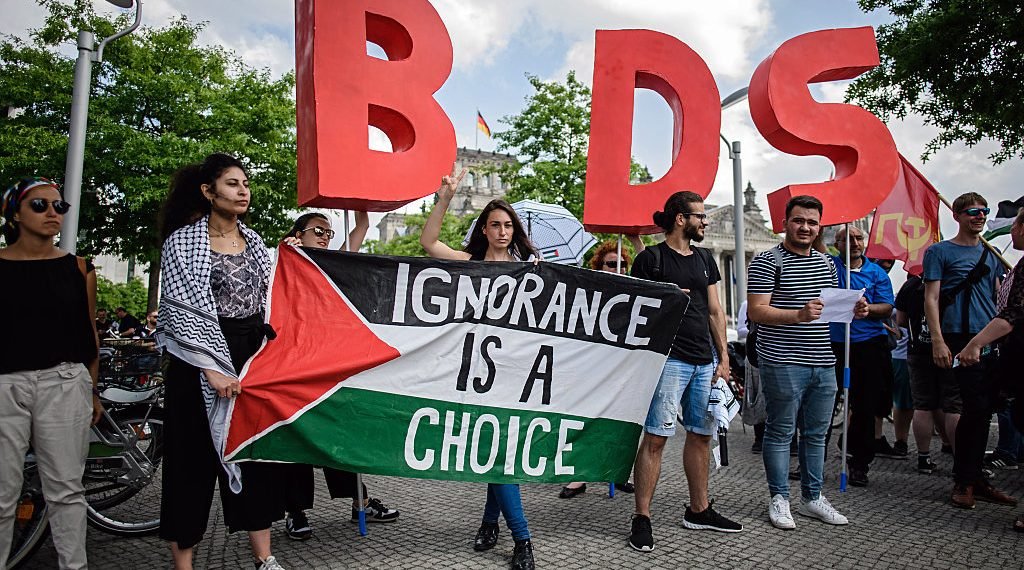Jonathan S. Tobin: Why the Left won't tolerate liberal Zionists
The Columbia Journalism Review touts itself as "the voice of journalism." While the magazine, which is published by the Columbia University Graduate School of Journalism, has faced accusations of liberal bias, it still retains a reputation as a prestigious source of commentary about the news media. So when CJR commissions a hit piece on a publication, it is an event of some significance and, at least in theory, ought to alert readers to serious misconduct.Jewish Harvard Club member assaulted during pro-Palestinian lecture, lawsuit says
The latest CJR exposé, however, is important not because it reveals biased or misleading reporting or unprofessional behavior. According to the magazine that still claims to be the "intellectual leader" of the press, the problem with The Forward is that it has taken a stand against left-wing anti-Semitism and appears open to publishing occasional dissent against its liberal editorial stands on American and Israeli politics.
The Forward's financial troubles made news last year when it ceased publishing in print, fired its editor and laid off much of its staff. I have strong disagreements with the left-leaning editorial philosophy that the English-language successor to the historic Yiddish newspaper has adopted since it ousted Seth Lipsky, its founding editor, in 2000. But I view The Forward's struggles as indicative of problems afflicting the media and Jewish publishing that transcend politics. We need publications that can reflect the legitimate debates on important issues that are being conducted in the United States and Israel.
But CJR's decision to publish a rant against The Forward's editorial decisions in the last year by far-left anti-Zionist writer Mairav Zonszein is important. That's because what CJR has done here is essentially to smear a liberal Jewish journal because it had the temerity to call out left-wing anti-Semites like Reps. Ilhan Omar (D-Minn.) and Rashida Tlaib (D-Minn.), as well as anti-Semitic activity on campuses like Bard College. Zonszein claims that The Forward, which in recent years has disappointed many in the Jewish community by providing space to Palestinian opponents of Israel and Zionism, let the left down by calling out such hatred and claims that its occasional publishing of conservative opinion is "polarizing."
She also cheers CNN contributor/writer Peter Beinart's defection from The Forward to the smaller but openly anti-Zionist Jewish Currents, as a harbinger of a power shift on the Jewish left.
It is curious that CJR would consider Zonszein, whose work has regularly appeared in far-left anti-Israel publications like Jewish Currents, +972mag and The Nation, to be qualified to comment in their august pages on any subject, let alone a Jewish one. But as new Forward editor Jodi Rudoren pointed out, it was a gross breach of journalistic ethics on the part of CJR to commission her to write an evaluation in a forum supposedly dedicated to the study of journalism about a publication that she has bitterly criticized in rants on Twitter and elsewhere. The Forward was entirely correct to refuse to cooperate in the writing of an article that could not possibly have been fair in its treatment of its subject.
A Jewish member of the Harvard Club claims she was assaulted by a professor during a pro-Palestinian lecture at the swanky venue — and then was booted by the Ivy League institution.Does the EU hear the Israeli public?
Vanesa Levine is suing to get reinstated to the prestigious Midtown club, whose notable present and past members include Michael Bloomberg, John F. Kennedy and Franklin D. Roosevelt.
Levine, 28, a marketing manager in Brooklyn, said she was a newly minted member of the 154-year old club when she and her mom attended a February 2019 lecture called, “The Hundred Years’ War on Palestine” by Rashid Khalidi, a former press officer for the Palestinian Liberation Organization.
She said she “peacefully” asked during a question-and-answer session how Mideast peace could be achieved if Palestinians are taught “to support terrorism against Jews and Israelis.”
The audience erupted in “mob-like” fury at her query, according to the lawsuit.
Harvard finance professor Faris Mousa Saah, 53, called her a whore in Arabic and grabbed her by the arm, bruising it as he tried to take the microphone, according to court papers.
“I’ve been to hell and back ever since the Harvard Club incident,” Levine told The Post.
Though she was eventually able to ask her questions, Levine and her mom, who was born and raised in Israel, were asked by security to leave — with angry audience members following them into the hall, photographing her and chanting, “We’re going to get you expelled,” she charges.
Last October, the EU Delegation to Israel published an unusual tender, worth €285,000, soliciting the assistance of local public relations companies in order to “change the negative image” of Europe in Israel.
The proposal cites an EU-commissioned survey which demonstrates the extent of Israeli public mistrust of Europe. According to the survey, 55% see the EU as Israel’s “enemy,” while only 18% identify it as a “friend.” According to the Israeli news outlet ICE, the results of the survey reaffirm negative perceptions toward EU member states on a number of fronts, including their funding to non-governmental organizations (NGOs), claims that the EU supports the boycott, divestment and sanctions (BDS) campaign directly or indirectly, and even accusations that it “supports terror entities indirectly.”
These attitudes, apparently held by many Israelis, did not emerge suddenly. The EU is completely out of sync with Israelis on the issues that strike the deepest emotional chords, and is seen as tone deaf, at best, in appreciating the Israeli perspective.
Even if the public learns about the EU’s investment in cutting-edge scientific research at Israeli universities, they will not soon forget about how Europe flirts with BDS with product labeling or treating the anti-Israel movement as merely free speech.
Israelis see that the EU engages selectively with a narrow ideological group of civil society, such as B’Tselem and Breaking the Silence. They hear the repeated condemnations of Israeli policy concerning Area C of the West Bank, as if this is the major issue on the EU’s agenda.



































.jpg)

